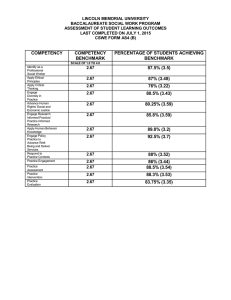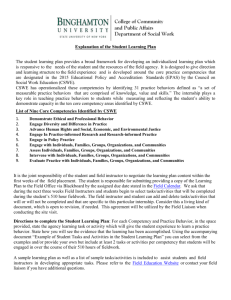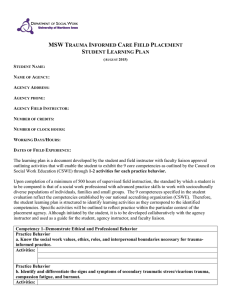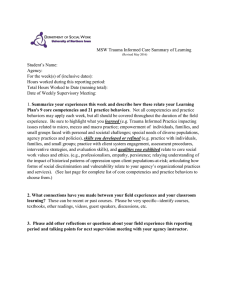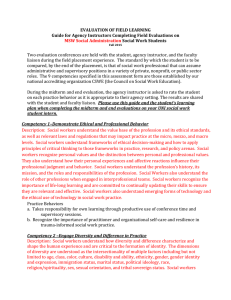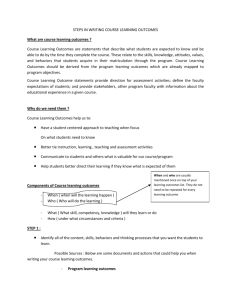MSW Program Social Work Competencies
advertisement
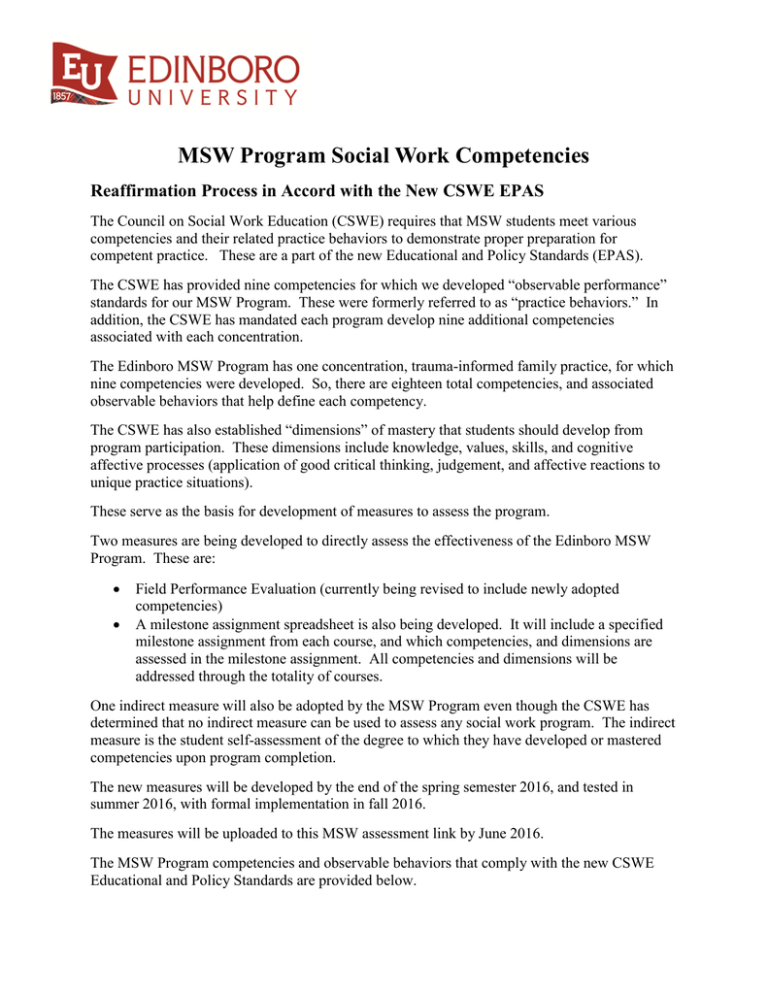
MSW Program Social Work Competencies Reaffirmation Process in Accord with the New CSWE EPAS The Council on Social Work Education (CSWE) requires that MSW students meet various competencies and their related practice behaviors to demonstrate proper preparation for competent practice. These are a part of the new Educational and Policy Standards (EPAS). The CSWE has provided nine competencies for which we developed “observable performance” standards for our MSW Program. These were formerly referred to as “practice behaviors.” In addition, the CSWE has mandated each program develop nine additional competencies associated with each concentration. The Edinboro MSW Program has one concentration, trauma-informed family practice, for which nine competencies were developed. So, there are eighteen total competencies, and associated observable behaviors that help define each competency. The CSWE has also established “dimensions” of mastery that students should develop from program participation. These dimensions include knowledge, values, skills, and cognitive affective processes (application of good critical thinking, judgement, and affective reactions to unique practice situations). These serve as the basis for development of measures to assess the program. Two measures are being developed to directly assess the effectiveness of the Edinboro MSW Program. These are: Field Performance Evaluation (currently being revised to include newly adopted competencies) A milestone assignment spreadsheet is also being developed. It will include a specified milestone assignment from each course, and which competencies, and dimensions are assessed in the milestone assignment. All competencies and dimensions will be addressed through the totality of courses. One indirect measure will also be adopted by the MSW Program even though the CSWE has determined that no indirect measure can be used to assess any social work program. The indirect measure is the student self-assessment of the degree to which they have developed or mastered competencies upon program completion. The new measures will be developed by the end of the spring semester 2016, and tested in summer 2016, with formal implementation in fall 2016. The measures will be uploaded to this MSW assessment link by June 2016. The MSW Program competencies and observable behaviors that comply with the new CSWE Educational and Policy Standards are provided below. MSW Competencies and Observable Behaviors 1) Competency 1: Demonstrate Ethical and Professional Behavior 1a) make ethical decisions by applying the standards of the NASW Code of Ethics, relevant laws and regulations, models for ethical decision-making, ethical conduct of research, and additional codes of ethics as appropriate to context 1b) use reflection and self-regulation to manage personal values and maintain professionalism in practice situations 1c) demonstrate professional demeanor in behavior; appearance; and oral, written, and electronic communication 1d) use technology ethically and appropriately to facilitate practice outcomes 1e) use supervision and consultation to guide professional judgment and behavior 2) Competency 2: Engage Diversity and Difference in Practice 2a) apply and communicate understanding of the importance of diversity and difference in shaping life experiences in practice at the micro, mezzo, and macro levels; 2b) present themselves as learners and engage clients and constituencies as experts of their own experiences; and 2c) apply self-awareness and self-regulation to manage the influence of personal biases and values in working with diverse clients and constituencies. 3) Competency 3: Advance Human Rights and Social, Economic, and Environmental Justice 3a) apply their understanding of social, economic, and environmental justice to advocate for human rights at the individual and system levels 3b) engage in practices that advance social, economic, and environmental justice 4) Competency 4: Engage In Practice-informed Research and Research-informed Practice 4a) use practice experience and theory to inform scientific inquiry and research; 4b) apply critical thinking to engage in analysis of quantitative and qualitative research methods and research findings 4c) use and translate research evidence to inform and improve practice, policy, and service delivery. 5) Competency 5: Engage in Policy Practice 5a) Identify social policy at the local, state, and federal level that impacts well-being, service delivery, and access to social services 5b) assess how social welfare and economic policies impact the delivery of and access to social services; 5c) apply critical thinking to analyze, formulate, and advocate for policies that advance human rights and social, economic, and environmental justice. 6) Competency 6: Engage with Individuals, Families, Groups, Organizations, and Communities 6a) apply knowledge of human behavior and the social environment, person-in-environment, and other multidisciplinary theoretical frameworks to engage with clients and constituencies 6b) use empathy, reflection, and interpersonal skills to effectively engage diverse clients and constituencies. 7) Competency 7: Assess Individuals, Families, Groups, Organizations, and Communities 7a) collect and organize data, and apply critical thinking to interpret information from clients and constituencies; 7b) apply knowledge of human behavior and the social environment, person-in-environment, and other multidisciplinary theoretical frameworks in the analysis of assessment data from clients and constituencies; 7c) develop mutually agreed-on intervention goals and objectives based on the critical assessment of strengths, needs, and challenges within clients and constituencies; and 7d) select appropriate intervention strategies based on the assessment, research knowledge, and values and preferences of clients and constituencies. 8) Competency 8: Intervene with Individuals, Families, Groups, Organizations, and Communities 8a) critically choose and implement interventions to achieve practice goals and enhance capacities of clients and constituencies 8b) apply knowledge of human behavior and the social environment, person-in-environment, and other multidisciplinary theoretical frameworks in interventions with clients and constituencies 8c) use inter-professional collaboration as appropriate to achieve beneficial practice outcomes 8d) negotiate, mediate, and advocate with and on behalf of diverse clients and constituencies 8e) facilitate effective transitions and endings that advance mutually agreed-on goals. 9) Competency 9: Evaluate Practice with Individuals, Families, Groups, Organizations, and Communities 9a) select and use appropriate methods for evaluation of outcomes 9b) apply knowledge of human behavior and the social environment, person-in-environment, and other multidisciplinary theoretical frameworks in the evaluation of outcomes 9c) critically analyze, monitor, and evaluate intervention and program processes and outcomes 9d) apply evaluation findings to improve practice effectiveness at the micro, mezzo, and macro levels. 10) Competency 10: Demonstrates Ethical and Professional Behaviors when Working with Traumatized Populations. 10a) Make ethical decisions by applying the standards of the NASW Code of Ethics, relevant laws and regulations, models for ethical decision-making, and additional codes of ethics as appropriate to context with traumatized populations. 10b) Demonstrate awareness of the impact of vicarious trauma on one’s own practice behaviors for individuals, families, groups, organizations and communities. 10c) Utilize supervision to recognize one’s own trauma history to promote professional responses in working with individuals, families, groups, organizations and communities. 11) Competency 11: Recognize Diversity and Differences with Trauma Clients. 11a) Demonstrate understanding of the differences in the perception and expression of trauma in relation to intersections of diversity with individuals, families, groups, organizations and communities. 11b) Incorporate the impact of historical and systemic sources of oppression and discrimination in assessing trauma history with individuals, families, groups, organizations and communities. 11c) Practice the five trauma-informed care principles on diverse clients with individuals, families, groups, organizations and communities. 12) Competency 12: Recognize how Trauma-Informed Care Advances Human Rights, Social and Economic Justice. 12a) Identify barriers to human rights, social, and economic justice imposed by trauma with individuals, families, groups, organizations and communities. 12b) Engage in trauma-informed practices that contribute to the alleviation of social and economic barriers with individuals, families, groups, organizations and communities. 13) Competency 13: Engage in and use Trauma-Informed Research in Practice. 13a) Demonstrate ability to understand trauma-informed evidence-based research with individuals, families, groups, organizations and communities. 13b) Implement trauma-informed and evidence-based research to inform and improve practice, policy and service delivery with individuals, families, groups, organizations and communities. 14) Competency 14: Engage in Trauma-Informed Policy Practice. 14a) Recognize the impact of policies and procedures that may be incongruent with trauma histories. 14b) Critically analyze and promote policies that are cognizant of trauma histories. 15) Competency 15: Engage with Individuals, Families, Groups, Organizations and Communities in a Trauma-Informed Manner. 15a) Develop an understanding of how personal trauma history impacts ability to engage diverse client systems. 15b) Incorporate assessed trauma history as part of engagement with individuals, families, groups, organizations and communities. 16) Competency 16: Assess Individuals, Families, Groups, Organizations and Communities in a Trauma-Informed Manner. 16a) Assess the impact of traumagenesis across individuals, families, groups, organizations and communities. 16b) Utilize trauma-informed assessment to develop specific strategies for intervention. 16c) Apply the five trauma-informed care principles in assessment methods with individuals, families, groups, organizations and communities. 17) Competency 17: Intervene with Individuals, Families, Groups, Organizations and Communities in a Trauma-Informed Manner. 17a) Respond appropriately to disclosure of trauma histories with individuals, families, groups, organizations and communities. 17b) Apply the five trauma-informed care principles to interventions with individuals, families, groups, organizations and communities. 18) Competency 18: Evaluate Practice with Individuals, Families, Groups, Organizations and Communities in a Trauma-Informed Manner. 18a) Evaluate the application of trauma-informed care at all levels of practice with individuals, families, groups, organizations and communities. 18b) Apply evaluation findings to improve trauma-informed care practice effectiveness with individuals, families, groups, organizations and communities.
